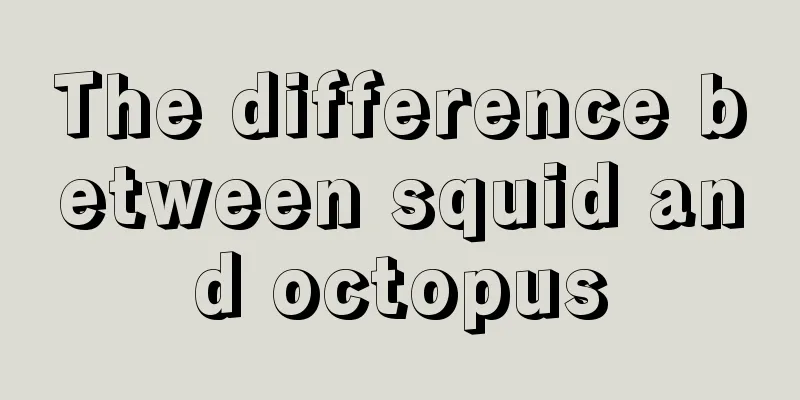The difference between squid and octopus

|
Octopus is usually called octopus. In fact, the taste of small octopus is very good. It is not only delicious but also a good nourishing ingredient. Speaking of octopus, we have to talk about squid. Many people usually confuse octopus and squid. Some people even think that octopus is squid. In fact, there is a big difference between the two. The following is a detailed introduction to the difference between squid and octopus. The difference between squid and octopus The difference between octopus and squid is not only in appearance, but also in their nutritional value. Octopus is rich in nutrients such as protein and minerals. Vegetarian food can nourish blood and replenish qi. Although squid is high in protein, it is low in fat, making it very suitable for people who are losing weight. Squid is also a It is a good brain tonic. Eating more of it can effectively prevent cardiovascular diseases. Octopus and squid are both cephalopods, but the number of legs they have is different. Octopus is also called "Octopus", squid is also called cuttlefish, calamari, octopus and because of their delicious meat. Therefore, when purchasing these two types of seafood, you must carefully look at Obviously, you can also choose what you need to eat based on their different nutritional values. How to eat octopus and squid Sweet Squid Ingredients: 1 fresh squid, 1 green onion, 5 slices of ginger, 4 green and red peppers Seasoning: 30ml sweet chili sauce, 15ml white wine, 15ml cooking wine, 8g sugar, salt to taste, starch to taste practice: 1. Separate the squid's head and body, cut open the abdomen, remove one of the transparent bones, then tear off the black film on the squid's outer layer and rinse it repeatedly with clean water; 2. Tilt the squid about 45 degrees and gently cut a cross-grid pattern, then cut it into pieces about 4 cm long and 2 cm wide; 3. Add water to a wok and bring to a boil over high heat. Add the chopped squid to the water starch and mix well. Marinate for 5-10 minutes. 4. After the water boils, add onion, ginger and cooking wine, then add the squid and stir-fry until the squid turns white and patterns appear; remove from the pan; 5. Rinse the squid repeatedly with clean water, then drain and set aside. 6. Add oil to the wok and heat it to 40% hot, add the remaining onions and ginger and stir-fry until fragrant, then add the squid; 7. Add sweet and spicy sauce, sugar and salt, mix well, then add green and red peppers, pour in high-proof white wine, mix well and serve. Sautéed Octopus with Soy Sauce Ingredients: 500g octopus, corn oil, salt, soybean paste, shallots, leeks, ginger, garlic practice: 1. Tear off the skin of the octopus, remove the internal organs, cut off the eyes, pick out the teeth, and rinse them repeatedly; 2. Blanch the cleaned octopus in boiling water, remove it and drain the water for later use. Cut the leek into sections, and chop the onion, ginger and garlic for later use. 3. Heat the wok and add corn oil, then sauté onion, ginger and garlic until fragrant, then add a large spoonful of soybean paste and stir-fry; 4. After the sauce flavor comes out, add the blanched octopus and stir-fry for a few times; 5. Add leek segments and appropriate amount of salt, stir-fry and serve. Nutritional value of squid 1. Squid is rich in taurine Although squid contains a high cholesterol content, it also contains a substance called taurine, which can inhibit the accumulation of cholesterol in the blood. As long as the ratio of taurine to cholesterol in the food you consume is above 2, the cholesterol in your blood will not rise. Squid has a higher taurine content, with a ratio of 2.2. Therefore, when eating squid, cholesterol is only used normally by the body and does not accumulate in the blood. 2. Squid contains highly unsaturated fatty acids Squid fat contains a large amount of highly unsaturated fatty acids such as EPA and DHA, and the high amount of taurine contained in the meat can effectively reduce the cholesterol accumulated in the blood vessel walls and is very effective in preventing arteriosclerosis and the formation of gallstones. At the same time, it can supplement brain power and prevent Alzheimer's disease. Therefore, squid is a healthier food for middle-aged and elderly people who are prone to cardiovascular diseases. 3. Squid contains calcium, phosphorus and iron Squid is rich in calcium, phosphorus and iron, which are beneficial to bone development and hematopoiesis, and can effectively treat anemia; it is rich in phosphorus, which has the function of forming bones and teeth, promoting growth and repair of body tissues and organs, supplying energy and vitality, and participating in the regulation of acid-base balance. 4. Squid Contains Selenium Squid contains selenium. Although the content in the human body is not much, it is very important for improving immunity and preventing cancer. It also plays a big role in anti-aging and anti-tumor. 5. Squid contains cholesterol Squid is rich in cholesterol, which maintains cell stability and increases the flexibility of blood vessel walls. Maintain normal sexual function and enhance immunity. Cholesterol is divided into low-density and high-density. The cholesterol in squid is mainly high-density, which is beneficial and harmless to the human body. |
<<: What are the tendons on both sides of the spine called
>>: How many times can a condom be used
Recommend
The consequences of staying up late
Staying up late is not good for your health. If y...
Is breast cancer contagious to humans?
Mental stress is also closely related to the occu...
How to prevent brain cancer
In recent years, brain cancer has become one of t...
What are the dangers of tooth decay
The harm of tooth decay is actually quite large. ...
What should I do if I have a headache after falling
It is inevitable that there will be some bumps an...
How to correctly guide children's premature love
Especially after puberty, boys and girls will dev...
What are the symptoms of advanced liver cancer? These three phenomena will appear
According to the degree of disease development an...
Is it good to soak your feet and sweat all over?
Foot soaking can bring great benefits to people&#...
How to keep fresh frozen fish
The best way to preserve fresh fish is to store i...
Can stage 1 gallbladder cancer be cured?
The 5-year survival rate of gallbladder cancer is...
What should I do if my hairline is uneven?
Hairline repair surgery may be the only quick way...
What are the symptoms of cervical cancer? How to adjust your diet to prevent cervical cancer
Nowadays, the incidence of cervical cancer is get...
How to fry coarse salt
Coarse salt has many uses for the human body. It ...
What should we pay attention to in preventing laryngeal cancer
How to prevent laryngeal cancer? Laryngeal cancer...
What causes gallbladder cancer
In recent years, gallbladder cancer has become on...









